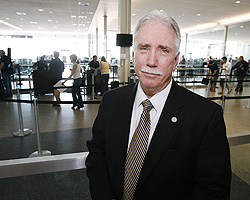Air Security TSA Strives to be Nimble: Ban on Complacency
News & Happenings
June 28, 2007

Morris McGowan, assistant administrator of
the office of security operations at the
Transportation Security Administration,
stands near a security checkpoint Monday
at Tulsa International Airport. Photo by
Stephen Holman / Tulsa World.
After the aircraft hijackings of 9/11, federal Transportation Security Officers focused on concealed weapons.
Shoe bombs were perceived as the next threat.
Then it was liquids and gels that could be mixed to form explosives.
Later, the target was airport employees using security clearances to smuggle guns and drugs.
Or, it was illegal immigrants using forged identification to pass through security checkpoints.
"If there's a threat, everything is subject to change," said Morris McGowan, assistant administrator of the office of security operations at the Transportation Security Administration in Washington, D.C.
McGowan, who oversees 43,000 TSA officers at 450 U.S. airports and an additional 4,000 TSA employees, is in Oklahoma this week to review federal security operations at Tulsa International Airport and Will Rogers World Airport in Oklahoma City.
McGowan's responsibilities include oversight of airport screening, regulatory compliance, budgetary and financial planning, operational security for all transportation modes and development of TSA's strategic planning.
With the range of potential threats arrayed against TSA, the agency is adapting and evolving, McGowan said, pointing to the terrorist plot in London last August as an example.
In London, authorities arrested more than two dozen people accused in a plot to detonate liquid explosives aboard 10 U.S.-bound commercial jets. TSA responded with an expanded list of prohibited items that include liquids and gels in containers of more than 3 ounces in carry-on baggage.
TSA also raised the threat level to orange, or high, where it remains.
"If you look at Aug. 10, in literally six hours we were able to change the security paradigm," McGowan said. "So, we have to maintain flexibility, our ability to remain nimble, so we have the ability to change immediately to meet the threat."
From the beginning, after TSA's formation following congressional passage of the Aviation and Transportation Security Act of 2001, agency critics said security screening functions should be shifted to each individual airport under TSA oversight.
Additionally, critics said, screening and other airport security duties should be redesigned along risk-based lines to better target resources on dangerous people, rather than dangerous objects.
McGowan concedes that the critics may have valid points. TSA is adapting and adopting, he said.
Privatization of security screening programs is being conducted at nine U.S. airports: San Francisco; Rochester, N.Y.; Tupelo, Miss.; Jackson, Wyo.; Kansas City, Mo.; Key West and Marathon, Fla.; Sioux Falls, S.D.; and Santa Rosa, Calif.
"It's a personal choice on the airport's part," McGowan said. "Once we set them up, they tell us if they want to opt out. They will run (privately operated security screening) until they opt out."
X-ray imaging of passenger bags, laptop computers and carry-on items also are being supplemented by SPOT, a TSA acronym for Screening Passengers by Observation Techniques, McGowan said.
"SPOT focuses on the hostile intent of an individual," he said, adding that TSA can't institute Israel's passenger profiling regime because of concerns about civil liberties as well as ethnic and religious discrimination.
"We're headed in that direction, but we have more civil liberty and privacy issues," he said. "Our system is based on behavior, not ethnicity. We are specifically training security officers to identify the behavior characteristics of someone with hostile intent."
Security officers also are fanning out in airports to randomly verify security badges and identification of airport and airline employees, he said.
"TSA can always do better," McGowan said. "I feel we should always be looking for ways to improve security. The minute we don't take that approach is the minute we set ourselves up for failure.
"Our adversaries aren't going to give up. You have to consider they're going to use every opportunity to attack."
By D. R. Stewart
Tulsa World Staff Writer
This article is reprinted with permission of World Publishing Co.
©Copyright 2007, World Publishing Co. All rights reserved.


